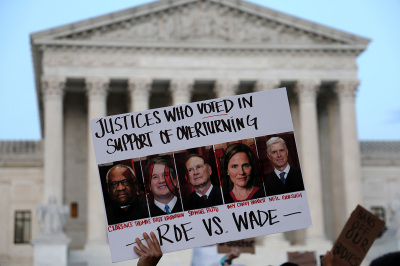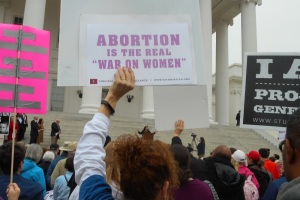With Roe v. Wade, abortion isn’t the real issue

Given the unauthorized leak of the Supreme Court’s draft opinion, I won’t dignify it by directly commenting on what might be the final outcome of the case currently under review. But since the mere possibility that Roe v. Wade might be rolled back has caused such a feeding frenzy among partisan activists, perhaps a broader perspective is worth noting.
That Roe v. Wade should be considered at risk in the hands of “originalist” Justices is telling. If Roe truly rests on a solid constitutional foundation, there should be no risk of its being overturned, especially by Justices committed to the original intent of the Constitution. When protesters panic at the thought of this landmark ruling meeting its demise, they are unwittingly acknowledging what objective observers in the legal community have said all along: that Roe, being a classic case of raw judicial fabrication, never had constitutional legitimacy.
From the very beginning, legal commentators across a broad spectrum have decried the legislative nature of Justice Blackmun’s 1973 opinion, not the least being its “trimester framework.” The controversial opinion prompted Watergate prosecutor Archibald Cox to comment that “[n]either historian, nor layman, nor lawyer will be persuaded that all the prescriptions of Justice Blackmun are part of the Constitution.”
In his widely-cited, 1973 Yale Law Journal article, Professor John Hart Ely offered a broader, more scathing assessment, saying that the Roe decision “is not constitutional law and gives almost no sense of an obligation to try to be.” Even Harvard Professor Laurence Tribe joined in the critical chorus, saying, “One of the most curious things about Roe is that, behind its own verbal smokescreen, the substantive judgment on which it rests is nowhere to be found.”
The heated abortion debate overshadows the more fundamental issue, which is all about judicial interpretation. While originalists have no need to indulge in “verbal smokescreens,” those who take a more dynamic approach to constitutional interpretation cannot survive without them.
By some irony, those who reject originalism are forced to come up with something cleverly original in order to circumvent the original! As in an artfully-contrived “right of privacy.” No matter how shrewdly couched in concepts sounding like constitutional parlance, it’s all the difference between honoring the original language and manipulating it in order to reach a desired outcome. No “constitutional right” can be taken away when it never was there to begin with!
In the bigger picture, there is an intriguing link between the two contrasting approaches to interpretation and corresponding political viewpoints. While conservative stances on social issues thrive on restrained interpretation of original language, constitutional support for liberal social issues invariably requires bold constitutional innovation. Never is that clearer than with Roe’s creative “constitutionalizing” of abortion out of shards from unrelated cases and concepts.
Abortion itself is a separate, moral question. The issue at hand is whether the Constitution can be twisted any way one might like. Of course, the Constitution can always be amended, but good luck with that. Alternatively, Roe could be enacted into law. Now there’s a novel idea…bona fide legislation by Congress rather than brazen judicial legislation by the Court!
F. LaGard Smith is a retired law school professor (principally at Pepperdine University), and is the author of some 35 books, touching on law, faith, and social issues. He is the compiler and narrator of The Daily Bible (the NIV and NLT arranged in chronological order).




























